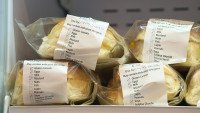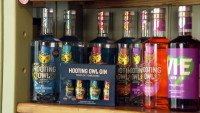Rules & Regulations / Health & Safety
Knowledge is Power
Red tape can entangle the opening of any business, especially retail.
The good news is that most of the information you need is online!
CFCS Management Committee web-searched their way to a Food Hygiene Certificate, discovered (and attended) workshops for social entrepreneurship, sourced appropriate insurance, and learned all about health and safety compliance and licensing. All of which formed the basis of the Operating Procedures for CFCS - so this was time well spent!
Although we are blessed with a core team of trusted volunteers, we felt that the responsibility for handling cash and banking procedures was best placed in as few hands as possible. One side effect of the COVID-19 pandemic was CFCS becoming almost a cashless business, and this is becoming normal practice with most retail outlets.

To save you some time, we’ve gathered all our research in one place on rules, regulations and compliance for your community shop including:


Health & Safety
Monitored by the Health and Safety Executive, it is the role of environmental officers from the local authority to visit shops, primarily to advise and then to ensure that correct practices are being enforced and dangerous practices are avoided.
Whilst overall responsibility for health and safety control rests with the management committee, it is the responsibility of all - management committee, staff and volunteers – to ensure that the shop is a safe environment.

Safety first
Make early contact with environmental health officers so that they have the earliest opportunity to advise on your plans. Find your local officer here.




Be prepared
Your local authority may request an inspection of the premises. Be sure to prepare thoroughly for the inspection to give you the best chance of getting a top rating (5) in the Food Hygiene Rating Scheme.
For more information visit the Food Standard Agency website




Take heed
The ‘Food Industry Guide to Good Hygiene Practice: Retail’ is a good place to start.
This guide will help you to understand assessment charts that enforcement officers will follow to check that your shop is compliant with regulations.


Better safe than sorry
The links below provide practical advice to those responsible for fire safety in small and medium sized businesses.
They provide guidance on how to make sure you are meeting the Regulatory Reform (Fire Safety) Order 2005.

Business Buildings
This covers your building being damaged or destroyed by an insured event. Depending on the policy, this cover could include burglaries, vandalism or natural disasters.
Business Contents
This is similar to a home contents policy. It will protect the contents of your shop, including furniture and office equipment. However it generally won’t cover any items classed as ‘stock’.
Stock
You’ll need this to protect any stock items that wouldn’t fall under a business contents policy in case they’re damaged or stolen. Some insurers might require you to keep your stock stored in a certain way, to keep it from getting damaged or stolen, in order to qualify for cover.
Public Liability
This is particularly useful for businesses that frequently interact with the public, especially shops which serve customers. It can cover the cost of legal fees and compensation if a member of the public is injured, or their property is damaged, on your premises.
Product Liability
If any of your products cause illness or injury then this can cover your legal fees and compensation payments. Even if the product wasn’t manufactured by you, this compensation cover can be invaluable for shop owners.
Employers’ Liability
If you employ other people in your shop you’ll be legally required to take out this cover. It is the only type of business insurance that’s mandatory and will cover you if one of your employees becomes ill, or is injured, as a result of a work related activity.
Professional Indemnity
If you give out advice or offer expertise as part of your business and a client (or customer) contends that you were negligent in giving the advice, this cover will protect any ensuing costs.
Business Interruption
If the running of your shop is disrupted, for example as a result of an injury, illness, or flood, then this policy can help cover any lost income or rent that you are obliged to pay.
COVID-19 pandemic
Recent global events have highlighted how few businesses possessed adequate Business Interruption cover. The potential effects of the SARS outbreak in 2002/03 alerted insurers to the risk that the rapid spread of a new disease might bring. As a result, insurers around the world reviewed and rewrote policies to exclude such events. Be specific when requesting cover and ensure your policy clearly states you are covered for a ‘notifiable disease or pandemic’ (which the UK Government will declare and which will trigger insurance pay outs).

Value your building and stock
If you rent your premises, your landlord may already have Business Buildings Insurance in place, so check first before buying a policy
You may be able to specify the level of cover you require such as the value of your stock up to a certain value. Generally insure stock at ‘cost’ price (not retail) as the latter is often higher. Your insurer may invalidate your claim if items are overvalued.

Accountancy & Banking
Till System
An EPOS till for your business offers control and security. A properly set-up stock system which uses the functionality of EPOS to scan and read product barcodes ensures quick and accurate sales to customers – and reassures them that they are paying the correct price for goods.
EPOS till systems have the facility to enable the setting of profit margin on products (important if your Community Shop is wholly not-for-profit) and it will publish reports of trading on demand to assist with cashing up, and balancing the books on a daily basis upwards.
Cash
If cash is accepted in your Community Shop (i.e. the till contains a ‘float’) clear lines of responsibility amongst your team regarding daily takings and cashing up are essential to avoid any lapses in security. Ideally there should be a safe on your premises with the access code known to a limited number of team members.
Bookkeeping
It would be advisable to enlist the services of an accountant or bookkeeper to carry out the daily/weekly reconciliation of accounts (ideally a member of your volunteer team!). Year-end accounts will require the services of a qualified accountant - again these services may be negotiated as a pro-bono service from contacts within your community.
Stock take
The management committee and accountant should collectively be in control of purchase invoices and payment of accounts, together with the control of stock management. An annual stock-take process should take place (for determining the value of stock held by the business).

Many hands make light work
CFCS organise an annual stock take which transforms into an opportunity for many volunteers to get involved – often becoming more of a social event allowing everyone to catch up, accompanied by slices of cake and plentiful cups of Yorkshire Tea on offer!
Off the shelf accounting
Sage or Quickbooks are robust ‘off the shelf’ online account packages that are simple to use. They provide the basic functionality required for running small business accounts e.g. VAT calculations.
Don't forget your dues
HMRC offers advice and guidance on managing any payments of Business Tax including VAT.
Overdraft
Borrow money through your business account - but watch out for expensive fees.
Debit cards
Payments by card in person, online or by phone (possibly numerous cards).
Online banking
Manage your business account through the lender's website or app.
Post Office banking
Conveniently pay cash into your account at a Post Office.
Chequebook
Pay bills or one-off payments by cheque.
Branch banking
Deposit cash or cheques and convert notes into coins.
Interest
Earned on a positive balance in your business bank account.
Accounting software integration
Offers convenience to run your business.

Shop around
Research banking providers thoroughly and compare the level of services offered and overall costs
Visit www.money.co.uk or www.knowyourmoney.co.uk for help finding the best deals available.




